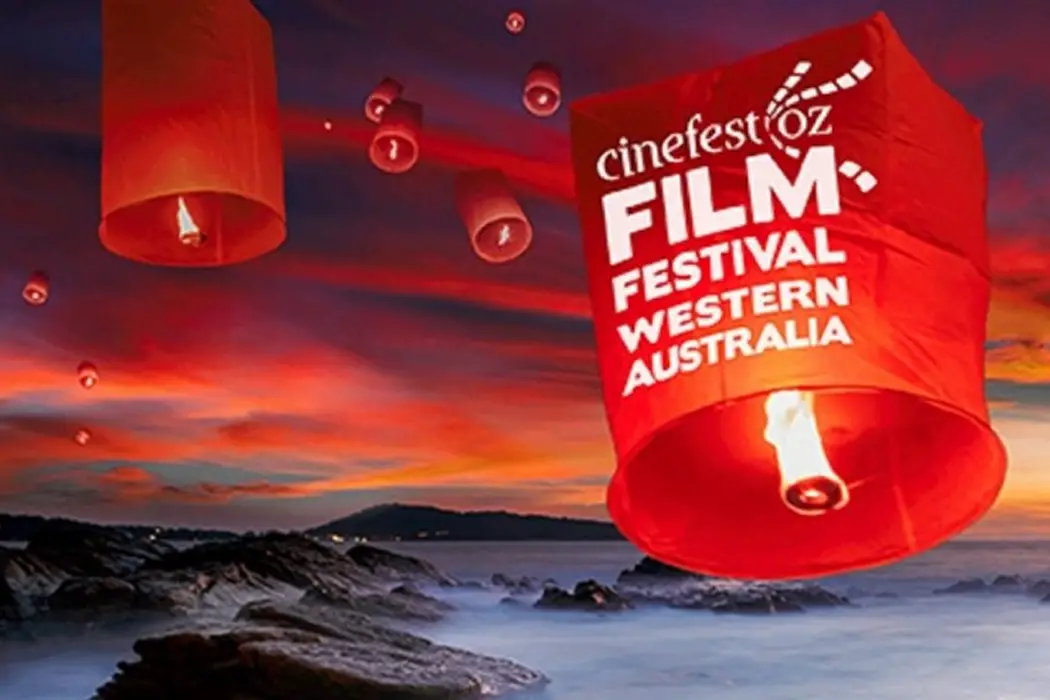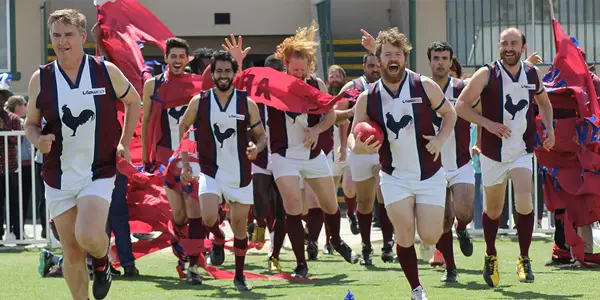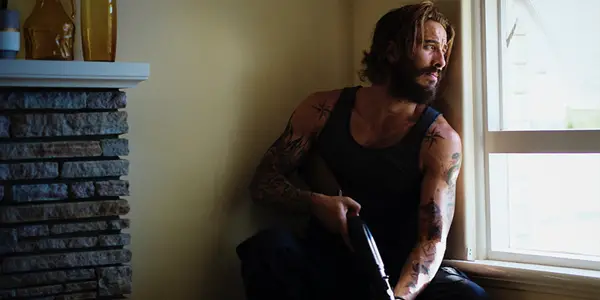CinefestOz 2018 Festival Report: JIRGA, 1% & THE MERGER

Alex is a 28 year-old West Australian who has a…
Returning for my second year of CinefestOz, the premiere Australian film festival located down south in Western Australia, was quite the experience this time. Held over five days, CinefestOz is a great place for emerging and veteran members of the Australian film industry and the public to mix within the wine regions of Busselton, Bunbury, Dunsborough and Margaret River, with four major films competing for the record-breaking $100,000 film prize.
This year’s competition lineup was quite the diverse selection; Bruce Beresford’s period drama Ladies in Black (which played opening night, but due to an embargo, cannot be reviewed until later in September), Benjamin Gilmour’s Middle East endeavour Jirga, Mark Grentell’s feel-good footy film The Merger and Stephen McCallum’s internationally recognised biker flick 1% (a lack of female nominees continues to be a problem, with a male-dominated director slate occurring last year too).
This is a review of the three competition titles, with another report on the non-competing features coming soon (as well as a full review on Ladies in Black when possible).
Jirga (Benjamin Gilmour)

Wedged between two dramatic-comedies about the refugee experience in Australia, Benjamin Gilmour’s sophomore feature Jirga is a nice variation in CinefestOz’s competition lineup, a film focused on the reverse – an Australian being a refugee in the stark deserts of Afghanistan. Paramedic-turned-director Benjamin Gilmour’s engaging follow-up to 2007’s Son of a Lion provides plenty of food for thought, but it’s the difficult production issues that he faced that actually has people talking, as he faced trouble when the original plan to shoot in Pakistan was quickly rejected by their government due to its political ideology.
After they sent undercover spies after the production crew, Gilmour lost majority of his funding, thus he made the last minute decision to shoot in Afghanistan with little to no money. This complication proved to be both a blessing and a curse, as shooting in the actual country that the story is set in lends it a crucial authenticity, with its beautifully barren landscapes doing a lot of the heavy lifting for the documentary-like cinematography, which was shot on a camera bought in a Pakistani Shopping Mall, without any stabilisation or sound equipment (the budget cuts forced Gilmour to shoot his own film, who only took a camera operator role due to its low-fi nature). A surrealistic detour into a remote river in the middle of the desolate desert, where our two leads ride upon a soviet-era swan-boat, is remarkably eye-catching, a terrific visual no matter what technology it was captured on.
Mike (Sam Smith, not the musician), an ex-soldier locked in severe state of PTSD, has returned to Afghanistan to find the family of a civilian he accidentally killed during the war. Armed with a hidden stash of cash and good intentions, his determined journey is one matched with heavy resistance; his original guide abandons him (an incident that reflects what actually happened to the director), and everyone else refuses to transport him there due to its proximity to Taliban-dominated territory. After convincing a taxi driver to take him halfway (Son of a Lion’s Sher Alam Miskeen Ustad), Mike’s road to redemption appears to have an abrupt end when he’s captured by the Taliban, until they decide to let his fate be decided by the local jirga, an Afghan court of tribal elders.
Gilmour’s minimal script defies any traditional formats, as it’s a tale carried by emotion rather than narrative – thankfully there is no long-winded monologues about why Mike’s so adamant in seeking forgiveness because we naturally understand the empathetic and cathartic nature behind his actions. This is a skillfully simple story that escapes the kind of strident cliches which movies of this type are prey to, this film is more interested with the sobering repercussions of violence, rather than the pursuit to cause more of it. Acclaim should be rewarded to the editor Nikki Stevens, who, thanks to the encouragement of Screen Australia and famed producer John Maynard, was able to trim 38 hours worth of rough footage into a brisk and efficient 78 minutes – if all movies were this length, the world would be a better place.
Despite its Afghan setting and characters, it’s filled with traditionally recognised symbols that are common to all cultures, with a strong focus on the universal nature of music and its transformative ability to cross any language barrier. A rusty guitar that Sam accidentally picks up from a pawn store becomes an integral part in his short-lived bond with his elderly taxi driver, setting up for a sly, ironic twist when he learns about the identity of the man that he mistakenly murdered. Gilmour’s decision to subvert common stereotypes about the Taliban, based upon true accounts of captured soldiers who received surprisingly sincere hospitality from them, is bound to cause controversy with some Australians upon its wide release into cinemas.
When dealing with a film like this, whose technical aspects were severely neutered by unforeseen circumstances, it must be judged on the success with which the director is able to enunciate himself through the formal elements of the framework that he has available to him. It might not be as polished or meticulous as its contemporaries, but its motives, and the audacious effort to bring them to life, should be congratulated – the eventual DVD release is going to have one hell of a behind-the-scenes featurette.
The Merger (Mark Grentell)

Spawned from Damian Callinan’s one man show of the same name, The Merger is a good-natured underdog sports story that wears its big heart on its guernsey sleeve, a charismatic comedy that I’d regard as the first great film about Australian Football. It’s been a while since there’s been a major movie centred around the popular Australian sport, with the only real comparisons being the 80’s antiques The Club and The Great McCarthy, so Mark Grentell’s second feature (coming off his well-received cricketing comedy debut) should play well with audiences down under, thanks to its contemporary themes, ocker charm and genuine love for the beloved goal-kicking pastime.
Reprising the role that he originated on stage, Callinan plays disgraced footballer Troy Carrington, a self-professed hermit who hides in the small country town of Bodgy Creek (portrayed by the NSW regional city of Wagga Wagga), ostracised by his community due to his vital role in closing the local Timber Mill, as well as nursing the crippling injury that cost him his athletic career.
Troy’s an unconventional man; his low-rent winery produces some off-beat flavours, his two best friends are a pair of llamas, he’s unwittingly become the subject of pre-teen Neil’s (Rafferty Grierson, son of Kokoda director Alister Grierson) home-video documentary, and when he’s asked to coach the failing Bodgy Creek Roosters footy team, his methods of doing so are as equally unorthodox. When Angie (Kate Mulvany) suggests Troy take the reigns from the residential relic ‘Bull’ (John Howard), he reluctantly accepts and decides to integrate the town’s newly-arrived immigrant residents into the fledgling team, which includes Syrian refugee Sayyid (Fayssal Bazzi), who slowly becomes the club’s secret weapon – both on the oval and in their team-building.
For a film about Australians learning to come together, it’s equally about them learning to let go, whether it be racial prejudices, burdens of past traumas, generational conflicts, grief and even nail polish in one of the many quirky subplots, where Snapper (the charming Josh McConville), one of Troy’s loyal players, manages to innovate his coach’s failed wines into a useful cleaning tool, which speaks to Callinan’s thematic thread of embracing new ideas, even if they may sound odd at first. The script deftly balances the comedy with the drama and despite its broad nature, it never softens the back-stories of the refugees who make-up their eccentric but devoted sports squad. The necessary tonal shifts are handled excellently, especially with how dark it gets at times – this is the Full Monty for the Footy field.
1% (Stephen McCallum)

Coming off its successful festival run, which included screenings at London, Toronto and Adelaide over the last year, Stephen McCallum’s 1% might need a title change before its international release (A24 has picked up the US rights), not only because it’s impossible to Google, but its numerical meaning has quite a different political meaning in the United States, as this is not a story about the most wealthiest Americans – quite the opposite actually.
The titular term actually refers to police slang coined in the 1970’s about the percentage of bikies who live above the law, which in this film’s case are the leather-strapped gang of the Copperheads. As an Australian feature with mainstream ambitions, it is a fine, solid piece of crime fiction, a slick assimilation of Hollywood conventions that derives from the developing sub-genre of “social realist Australian crime dramas”, a specific style which was popularised by the overnight success of David Michōd‘s Animal Kingdom – it’s refreshingly old-fashioned entertainment that takes itself so seriously that it’s actually quite hard to view it as such.
1% is an gritty gang flick soaked in blood, sweat, beer and cinematic history, with the haze of Once Were Warriors and Romper Stomper wafting in the air of the Copperheads hideout alongside the stale stench of hard liquor and tossed cigarettes. As the club’s president Knuck (Matt Nable) serves a three year stint in prison, Paddo (Ryan Corr) has successfully expanded the gang (an enterprise of vaguely-defined ventures), gaining new members and alternative avenues for more revenue, until his intellectually-disabled (and drug-addicted) brother Skink (Josh McConville) steals a stash of heroin from a rival gang, headed by the menacing Sugar (Aaron Pederson, who gets to have a ton of fun in an underused role). Paddo is able to reach a money laundering deal with Sugar to square things, but Knuck is released from prison, who immediately rescinds the deal and sets the path for one hell of a bikie battlefield.
It may be the men who pull the punches, but it’s the women who pull the strings, as Paddo considers his role within the gang alongside his long-term girlfriend Katrina (Abbey Lee), who has her own struggles against Knuck’s wife Hayley (Simone Kessell). Its Shakespearean ideals and use of devious female conductors have caused comparisons to Macbeth, but I found that its central sibling relationship made it more like Of Mice and Men on Motorcycles.
Like John Steinbeck’s novella, 1%’s thematic base is rooted upon the bonds of family, that despite the (literal) headaches they can cause, blood will always be thicker than water, especially when blood starts to be spilled. The coarse screenplay depicts the complexities and contradictions of Paddo and Knuck’s war in a series of hard-hitting confrontations, which evolve from fighting words to outright fighting, filled with difficult and controversial images that triggered quite a few walkouts during the CinefestOZ prize screening.
McCallum’s debut is filled with the exploitation-film vulgarity of the classic Australian Ozploitation era but without any of its trademark care-free, goofy extravagance (despite their surface level similarities, this is nothing like Stone). Every punch, gun-shot and kick to the stomach is as raw and unflinching as its dialogue and sexual content, with each conversation laced with an entire film’s worth of profanities. A reveal concerning Knuck’s newly discovered sexuality only feels inserted to frivolously degrade his character, and is easily the film’s most gratuitous element, as the audience is already given enough reasons to dislike him before his transformation into a vicious rapist.
Lets address the elephant in the room; Yes, 1% is very similar to the popular TV show Sons of Anarchy, as both explore the violence and power struggles within contemporary biker gangs, but it’s the underlying misanthropic message of Matt Nable’s script which sets the two properties apart. There’s one ironic scene which sees the recently returned Knuck rejecting a proposal to have the Copperhead’s insignia branded on sellable hoodies, which is funny because Sons of Anarchy’s pop culture legacy has survived through its substantial merchandising – there isn’t a clothing outlet store in the world that doesn’t have a black jumper with the SAMCRO logo on it hanging up in the corner right now.
It may be riddled with cliches, but they’re arranged in a fluid and economic manner, and I appreciate any new Australian release that is this unapologetic about the inherent genre qualities that come with being a modern outlaw biker movie. Much like riding a Harley, this film is loud, aggressive and not something that’s going to be loved by most people, but for those who hop on, will be in for quite the ride.
Do any of these upcoming Australian releases interest you? tell us your thoughts in the comments below!
Does content like this matter to you?
Become a Member and support film journalism. Unlock access to all of Film Inquiry`s great articles. Join a community of like-minded readers who are passionate about cinema - get access to our private members Network, give back to independent filmmakers, and more.













